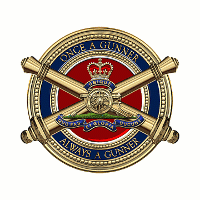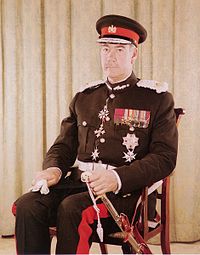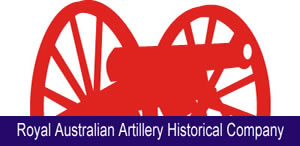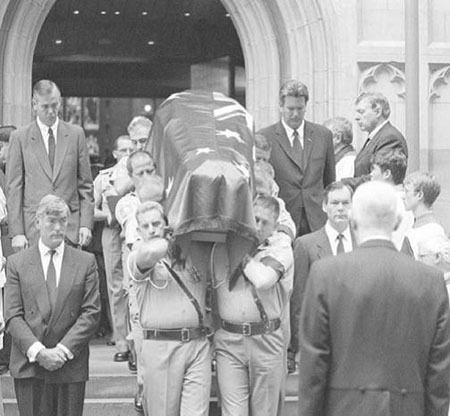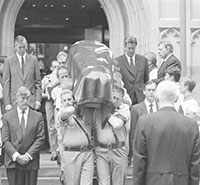Roden Cutler’s enlistment in 1936 was a routine event repeated thousands of times by his generation – not a portent for future fame - in his case, while a part-time economics undergraduate at Sydney University. He joined the University Regiment and transferred from infantry to their field artillery battery in 1939. By the end of that year he was gazetted lieutenant. It was here and later in his AIF service he made friends for life. He was that sort of man.
War had been declared and Cutler and his colleagues encouraged many from 118th Field Battery (of 18th Field Brigade) to volunteer for the AIF. The loyalty inspired by his CO (Lieutenant Colonel Clyde Ingate) during those waiting days were to influence Roden Cutler throughout his life. He claimed in his biography that this World War 1 Gunner gave 2/5th Field Regiment – to which he had been allotted - a wonderful spirit.
Lieutenant Cutler was ‘A’ Section Commander (of two guns) when he sailed with his regiment for the Middle East on 20 October 1940. Another period of waiting (five weeks) for stores, vehicles and guns was a good test of leadership, and his friend Norman Tinkler (his GPO) noted that “he was to show these qualities of leadership which bolstered morale of those that came under his influence”. When the 2/5 moved with 7th Division and some British Army units into Vichy Syria, Cutler was Wagon Lines Officer with 9 Battery. Appointed a 9 Battery OPO with Captain ‘Joe’ Clark on 17 June at Merdjayoun he took over when Clark died of wounds two days later. 19 days of furious action later Roden had distinguished himself and nearly succumbed to his serious wounds.
His citation (summarised) for NX12378 Lieutenant Arthur Roden Cutler was:
‘For conspicuous and sustained gallantry and for outstanding bravery during the bitter fighting at Merdjayoun supporting the infantry attack. He established his OP aheadof the infantry and in the fighting that followed his Bren gunner was killed and Cutler and another man manned the Bren gun and an anti-tank rifle and fought back, driving the enemy infantry away. He had been ordered to establish his OP to register the only road by which enemy transport could enter the town. An enemy attack was imminent and he was in danger of being cut off. Nevertheless he registered his battery on the road and enemy posts. He was forced to go to ground but at night made his way back through enemy lines. On 23 June he was in charge of a 25 pounder sent forward to silence an anti-tank gun and post. This he did and next morning Merdjayoun was captured. Later at Damour on 6 July when our infantrywere pinned down by heavy fire, Lieutenant Cutler regardless of all danger went to bring a telephone line to his OP when he was seriously wounded. 26 hours elapsed before rescue necessitating amputation of his leg. Throughout the campaign this officer’s courage was unparalleled and his work was a big factor in the capture of Merdjayoun’.
Roden Cutler was lucky to survive and made a good recovery at 2/1st AGH in Gaza. He returned to Australia on the ‘Oranje’ and heard of his award of the Victoria Cross in a news broadcast on board. He received his award from another VC holder, the Governor General, Lord Gowrie on 11 June 1942 at Admiralty House, Sydney.
Back in ‘Civvie Street’ he became State Secretary of the RSSAILA and then entered the
Commonwealth Public Service as Assistant Deputy Director of the National Security Service and later a Deputy Commissioner of the Repatriation Department. In 1945 he was appointed High Commissioner to New Zealand and thus began an illustrious diplomatic career.
In 1966 Sir Roden Cutler, VC was appointed Governor of New South Wales, and took up residence at Government House, his home for the next 15 years. He performed the role of governor with dignity and in so doing popularised the institution of governorship without compromising its essential character. Many politicians envied the high esteem in which he was held by people from all walks of life. Roden remarked to his son once, ‘(politics) is a game I had neither comfort nor confidence in’. He and his wife entertained modestly and in so doing brought understandings of his role to a wider community. He used his expertise in diplomacy to sometimes structure the guest list for luncheon at Government House, formally and informally, providing a neutral and calming influence for opposing viewpoints to reach understanding. He and his wife visited schools of all kinds and met with an enormous number of people from all walks of life across the State who to their dying day will remember, ‘I met the Governor, Sir Roden Cutler.’ He weighed into the republican debate late in life having seen political systems abroad as a diplomat. It convinced him that a Constitutional Monarchy brought stability, continuity and tradition to his country.
The more formal events required stature and presence acquired during his diplomatic career. He gave them a sense of occasion, and he was equal to any situation. He was Honorary Colonel of the Sydney University Regiment and the Royal New South Wales Regiment, and presented the latter with their Queen’s and Regimental Colours at colourful ceremonies during the sixties. He was an Honorary Air Commodore of the Royal Australian Air Force, and was Overseas Vice Chairman and Deputy President of the VC and GC Association from 1986 – 91. Roden Cutler was always to be found at a Rugby Test or Grand Final. He cooperated with novelist Colleen McCullough to produce a biography in 1998.
After 15 years as governor he retired and was appointed Chairman of the State Bank of New South Wales from 1981 to 1986. Above all, Sir Roden supported his Regiment throughout his career, especially after Government House. He was a regular guest at annual Gunner Dinners held at the School of Artillery, North Head, and frequently proposed the toast to the Regiment. On Sunday 2 December 1990, he formally opened the Royal Australian Artillery National Museum at North Fort, and his portrait hangs in the Artillery Hall with other memorabilia.
He married first, in 1946 Helen Morris, who died in 1990 and had four sons, Richard, Anthony,Mark and David. He married secondly Joan Goodwin, who survives him. Roden Cutler was a great Australian by any measure. We will not look upon his like again.
The Editor of Cannonball would like to thank the following friends of Sir Roden Cutlerfor their help with the obituary. Norman Tinkler, former Major, John Firth, former Captain, Peter Gibson, former Lieutenant and Gun Sergeant of 25 pounder A-1, all with Cutler in Syria; David Wood, former Lieutenant and his friend from SUR days. |
